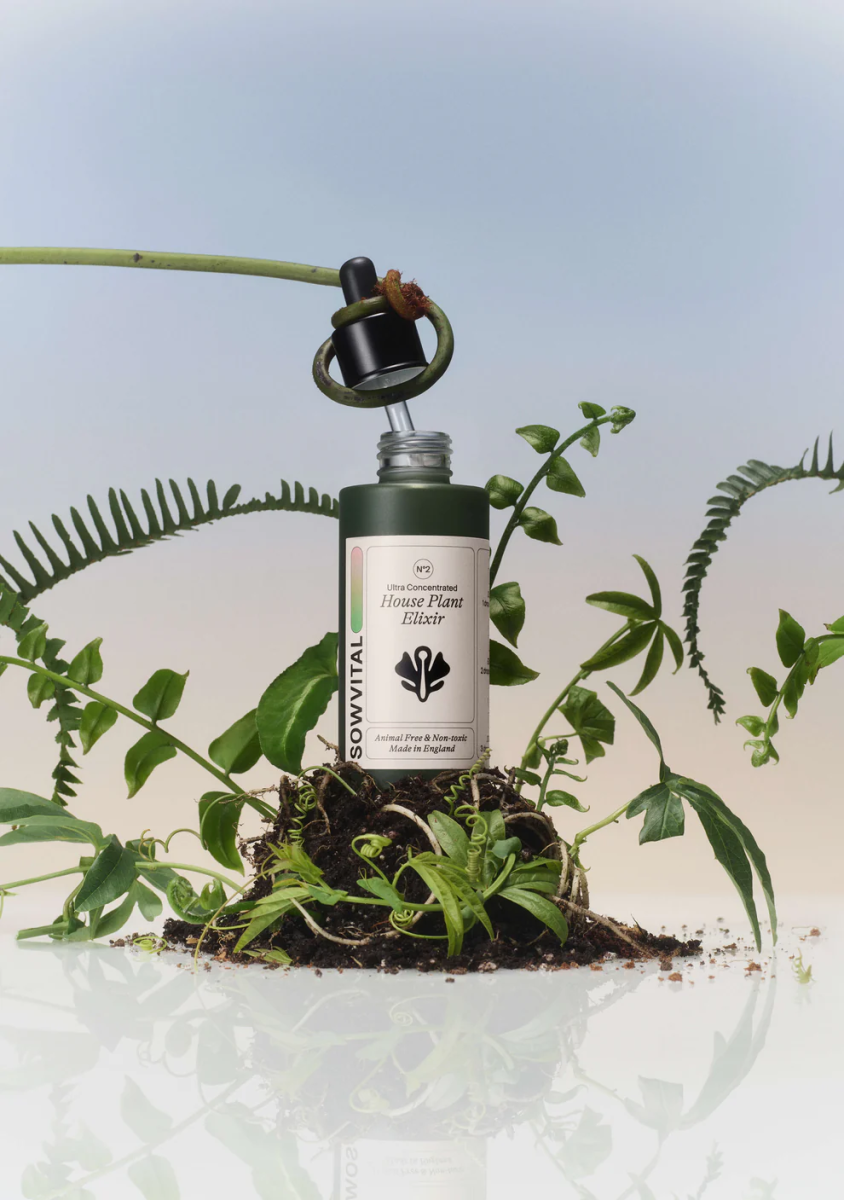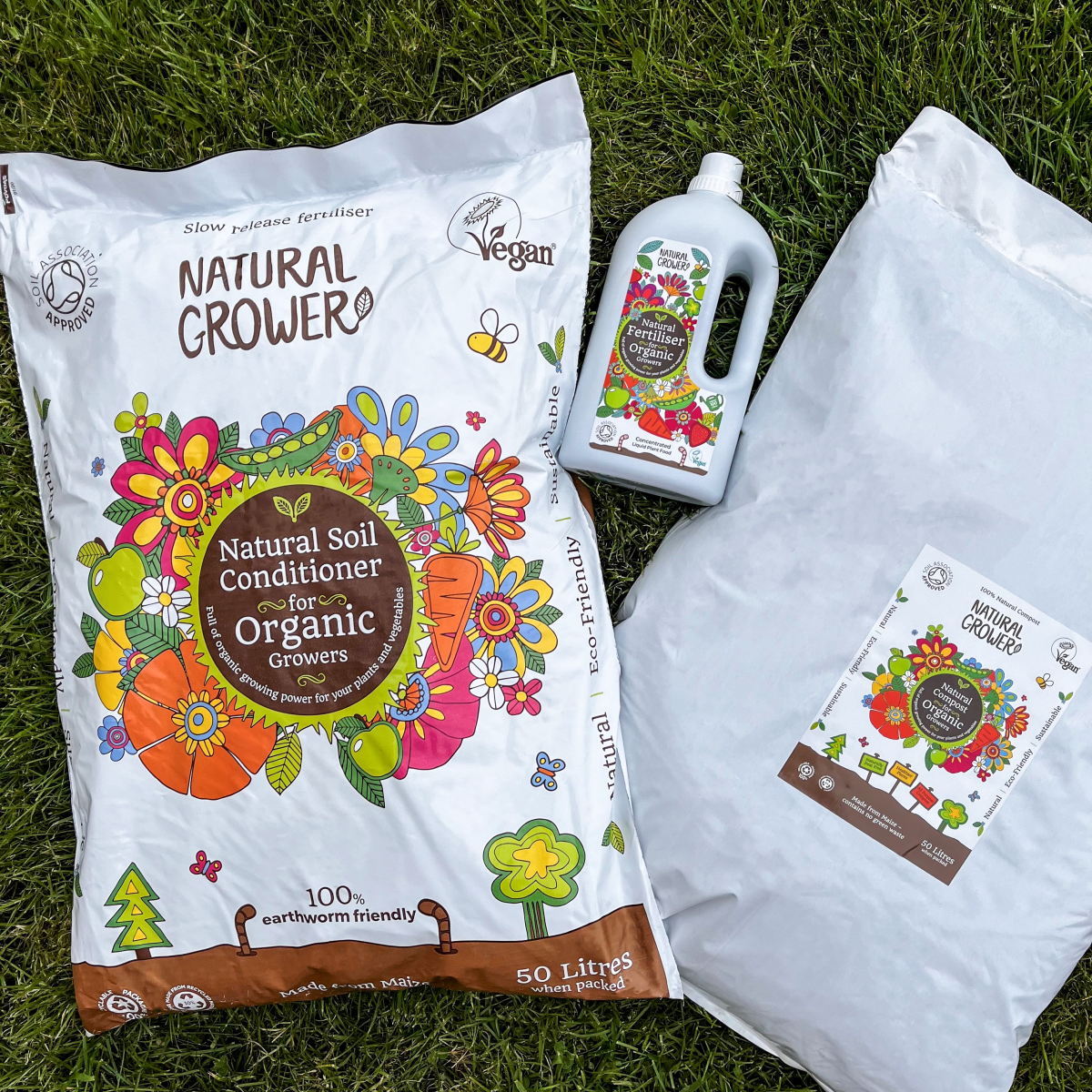If the warmer weather and longer days have got you embracing spring, then gardening is an amazing and rewarding hobby to put your energy into, and most people can get started with even just a windowsill. Don’t let your lack of a garden or allotment put you off! For those with well-seasoned green thumbs, those who are brand new, and everyone in between, we hope you can find some helpful tips and product recommendations for your vegan garden.
 Whether indoors or out, there are vegan gardening practices and products every nature-lover can employ to ensure your plant care is free from animal products and is the least harmful to other creatures as possible. Veganism is an entire belief system that aims to eliminate harm to non-human animals. Typical gardening practices and products can negatively affect animals in several ways, so make sure to check out the products from our trademark holders that we have listed below and some tips from our other blogs to ensure your garden is as vegan as your kitchen.
Whether indoors or out, there are vegan gardening practices and products every nature-lover can employ to ensure your plant care is free from animal products and is the least harmful to other creatures as possible. Veganism is an entire belief system that aims to eliminate harm to non-human animals. Typical gardening practices and products can negatively affect animals in several ways, so make sure to check out the products from our trademark holders that we have listed below and some tips from our other blogs to ensure your garden is as vegan as your kitchen.
Why do we feel drawn to plants?
Houseplants are a beautiful addition to any space, but there is a wealth of benefits beyond aesthetics to surrounding yourself with plants, including boosted mood, increased creativity, reduced stress, and improved air quality, to name a few.
“Biophilia: (according to a theory of the biologist E. O. Wilson) an innate and genetically determined affinity of human beings with the natural world.”
 The benefits of living in greener spaces have been studied and reported on, but with many of us working from indoor environments, and many living in apartments with limited or no garden access, it makes sense that indoor gardening is a fun and often a more accessible way to bring that connection to nature, indoors.
The benefits of living in greener spaces have been studied and reported on, but with many of us working from indoor environments, and many living in apartments with limited or no garden access, it makes sense that indoor gardening is a fun and often a more accessible way to bring that connection to nature, indoors.
If you’re fortunate to have access to an outdoor garden space, then your options for what you can grow and nurture expand massively, but so does the risk of finding yourself relying on non-vegan methods and products.
What’s not vegan about gardening?
Typical gardening practices and products rely heavily on the animal agriculture and fishing industries, but that doesn’t mean you have to. While animal products and by-products like manure, guano, dried blood, bone meal, ground feathers and fish scales, and harmful pesticides may be commonplace in conventional gardening products, it’s completely unnecessary to make use of them since there are plenty of vegan and more ethical alternatives to grow plants that thrive.
Easy vegan swaps for your garden
With over 60,000 products, The Vegan Society’s Vegan Trademark has checked and certified a range of products you can use when gardening, to ensure there are no animal products or by-products.
Before you get started gardening, you may need to give your space a clean. Bio-D Home & Garden Cleaner is a great option for clearing that dirt. If you have muddy boots or garden furniture that needs a good scrub, LoofCo has a Gardener's Brush that is perfect. Finally, after tending to your plants and getting your green thumb well and truly covered in soil, don't forget to show your hands a little extra love with a rich moisturizer such as Handy Gurugu from Lush.
1. Switch to vegan plant foods
Sowvital
A staple of their Vegan Trademark certified selection, House Plant Elixir is designed to be like a multivitamin for your house plants, providing the all-round nutrition your house plant needs. The actives will boost chlorophyll production, photosynthetic rate and resilience. Practically, this means larger foliage, stronger stems, and greater resistance to common plant stressors like forgetting to water for several weeks. Other great picks from their range include the Aqua Leaf Cleaner and the House Plant Spritz.
RocketGro
RocketGro Plant Fuel is a certified vegan and organic liquid feed with high levels of essential minerals, nutrients and microbes that will enrich your soil and get straight to the plant roots to boost their vitality and growth. You can also find other vegan selections in this range, such as the Peat-Free Natural Mulch.
Natural Grower
Natural Plant Feed is suitable for all plants, fruits and vegetables. This plant feed can be mixed into soil or compost before planting or used as a top dressing on the surface. It’s excellent at retaining moisture through dry summer months or when potted plants are kept in warm houses or offices.
Florasoul
The Plant Booster All Purpose Seaweed Flakes are a vegan, organic, non-GMO and biodegradable plant food (with 83% biodegradable packaging, too) which promotes growth, vitality, flowering, yield and fruit quality in a variety of plants.
BAC
Organic Grow from BAC Growth Nutrition is specially developed to meet all of a crop's needs during the growth cycle with high-quality and easily absorbed fertilisers. They also have a complete selection of vegan plant care products, including starter packs and various fertilisers. Click on your chosen product to see where it’s stocked near you, or purchase through BAC’s webshop.
2. Swap in a vegan compost or potting mix
Natural Grower
Natural Grower’s organic and peat-free Natural Compost is certified both vegan (by us) and organic by the Soil Association. Full of all the nutrients and trace elements outdoor and indoor plants need, this is an excellent all-round compost. Top up the nutrients with the liquid feed throughout the year for optimal yields.
Fertile Fibre
Explore the Vegro range of composts, which are certified vegan, organic, peat-free and Soil Association certified. The Vegan Multipurpose Compost is suitable for a range of plants and is particularly suitable for crops of vigorous growth and heavy production. Vegan Potting Compost is ideal for cuttings and propagation. Vegan Seed Compost is perfect for planting a variety of crops, especially those with heavy production.
Coir products
Coir Peat Coins are an alternate potting mix solution. Coir peat is a waste product extracted from coconut husk and is used to make coir peat discs. It has the same properties as standard coco peat, but the discs are smaller. The discs can expand to the required size and are ideal for seeding, rooting, and hydroponic growing. Plus, using coir is a more sustainable alternative to peat.
3. Ditch the dung and go for plant-based fertilisers
Natural Grower
Once diluted, the Natural Liquid Fertiliser can be poured around the base of plants in the garden or the home to be quickly absorbed as a potent source of nutrients. The liquid feed is suitable for all plants, fruit and vegetables, grass and trees. It is also excellent for feeding your indoor houseplants.
Andermatt
For a virtually odourless organic fertiliser made from natural plant waste, Andermatt has GroPure Liquid Fertiliser. This fertiliser is a complete blend of Nitrogen, Phosphorus, potassium, and micronutrients, making it suitable for use on any plant. Sustainable swaps are also important for Andermatt—you can find this product in recycled packaging, which you can also recycle when finished!
Plantgrow
Natural Soil Conditioner provides a water-retaining crumbly mix of nourishing plant food containing essential soil microbes that ensure healthy and sustainable growth for all plants, flowers, fruits, vegetables and roses, whether they’re grown in the garden or in pots and containers. Plantgrow’s entire range is Vegan Trademark certified, so check out their other offerings too.
4. Use non-disruptive gardening methods
Learn about the no-dig method and other vegan gardening tips in our blog from Andy Baxter.
5. Skip the harmful pesticides
Keep unwanted visitors from getting into your garden with vegan practices. Check out our blog from Rachael Baihn for tips on how to do this.
A quick guide to houseplant care
If you’re ready to become a vegan houseplant parent but don’t know where to start, your best bet is to give yourself the best chance at success with a plant that is low maintenance and will be forgiving when you inevitably make mistakes as you learn.
Plants have 3 non-negotiable needs:
-
Light. Even plants that may say ‘low-light’ will need some light to stay alive. Some prefer full sun on a south-facing windowsill, while others will need much less, dappled sunlight. Needs vary for different plants, so be sure to check the label.
-
Water. It is very self-explanatory, all living things need it, and plants will die quickly without it, but be careful not to over-water.
-
Nutrient-rich soil. Use a vegan houseplant potting mix to ensure the plant is getting the nutrients it needs to thrive
A basic rule of thumb you can never learn too soon for most plants is: lean on the side of under-watering rather than over-watering, as over-watering is one of the biggest culprits of root rot and plant death. It’s less maintenance for you, and your plants will thank you. Often the best way to tell if your plant is thirsty is to stick your finger about 2-3 inches into the soil, and if it feels dry, it’s time to water (often about once a week).
Remember that over-watering refers to the frequency, not the amount, though, and so when you do go to water, drench the soil until water is coming out of the drainage holes at the bottom, and then tip the water from the saucer or outer pot, so the roots aren’t sitting in water.
Here are a few recommendations you could check your local garden centre for:
-
Snake plant: with a range of varieties, the snake plant is nearly impossible to kill with the right care. It's not companion animal-safe, so keep well out of reach.
-
Pothos: a beautiful hanging plant, and one of the most easily finable, this is a great starter plant. There are many varieties to choose from. This one is also not companion animal-safe, so again, keep well out of reach.
-
Spider plants: they can grow in low light but will thrive in brighter light and will sprout tiny baby plants that you can cut off and make more plants with! Even better, these are companion animal-safe.
-
Monstera Deliciosa (cheese plant): They thrive with gentle sunlight and a good amount of water (they prefer slightly damp soil due to their tropical natural habitat).
We hope you’ve gained some useful insights into vegan gardening products and practices. If you enjoyed this blog and want to share your vegan garden or houseplant collection, make sure to tag @vegantrademark on Instagram or Twitter to join in the conversation. You can also follow us on Pinterest and follow our Vegan Gardening board to get inspired and plan your own space.
By Charis Collier, Brand Marketing Officer
The views expressed by our bloggers are not necessarily the views of The Vegan Society.


